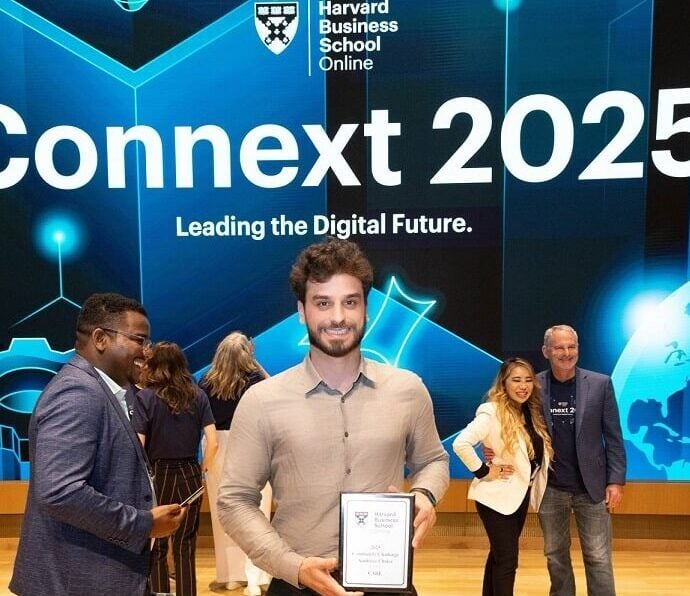

This year’s Connext, the prestigious annual conference of Harvard Business School Online, was a special moment for Antonis Tsarmanidis, a Harvard graduate. He was honored with the Audience Choice Award for The Care Effect campaign and its activation challenge CARE60, a social impact initiative that encourages employees to take sixty seconds of purposeful action each day.
Attendees from the Harvard community deeply connected with the campaign the Greek professional presented—which highlighted how small, everyday actions can have a big, social impact. This might include sharing educational content, donating the cost of a coffee, or using their voice online to support CARE, one of the world’s leading humanitarian organizations. CARE fights poverty and delivers emergency relief with a focus on empowering girls and women.
“This idea started with a simple question: how do you spark everyday action for a cause people care about?” Tsarmanidis, who was born and raised in Kozani, Greece, tells Greek Reporter. “I was inspired by the ALS Challenge and wanted to create something just as engaging, but with repeatable, daily impact. The school annually partners with a non-profit and brings people from around the world together, to develop fresh, innovative solutions to the real challenges these organizations face.”
The Greek marketing manager’s campaign was submitted to the Harvard Business School Online Challenge, a competition that invites students and alumni to design purpose-driven initiatives by relying on marketing strategies learned in their major. The challenge encourages participants to apply these concepts to real-world issues, with the potential of scalable social impact.
Submissions are reviewed by a judging panel, and the top three finalists, among which Tsarmanidis’ campaign was this year, present them live at Connext, Harvard Business School Online’s flagship conference, hosted on May 2 to May 3 this year.

Tsarmanidis says that small actions like those under the CARE60 challenge can collectively fuel real-world outcomes in crisis response and poverty relief, as well as help build a workplace culture rooted in empathy and action.
“It’s easy to adopt, it’s employee-led, and designed to scale without major infrastructure,” he says. “It received overwhelmingly positive feedback from the attendees at the conference, which shows that the message truly resonated with people from around the world. The campaign itself was a collaborative effort developed by a small team of three during the challenge, . . . [making] the experience even more meaningful.”

Antonis Tsarmanidis studied Mass Communications at the Aristotle University in Thessaloniki in northern Greece. Shortly after graduating, he was hired by a US company and moved to the United States. Since then, he has worked across multiple industries and now leads brand and digital marketing initiatives while also managing personal business ventures.
He says his Greek identity has played a role in everything he has accomplished thus far, including the CARE campaign. “Greek values like community, resilience, and generosity are part of who I am. They have shaped how I approach leadership and creativity in everything I do,” he says.
He notes that he has met other young Greeks like him in the United States, a Greek generation that is passionate, value-driven, and determined to lead change rather than just pursuing titles, and notes that “it’s inspiring.”
Greece, according to recent Eurostat data, is experiencing a notable shift in migration trends, marking the first time in nearly two decades that a brain gain rather than a brain drain is being seen.
The data indicates that approximately 350,000 out of the 600,000 Greeks who migrated abroad between 2010 and 2021 have now returned, marking a significant reversal of the talent loss experienced during the financial downturn.
Asked whether he would consider joining the thousands of other Greeks who are returning home, Tsarmanidis says that “Greece is part of who I am. I still have family there, and I can see myself splitting time between both countries in the future. As Demosthenes said, ‘The future is likely uncertain.’ But that’s often where the best journeys begin.”
